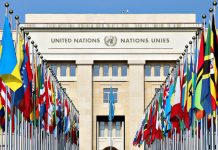Athens: Standing by the tiny grave of his five-year-old son in the Orthodox Christian cemetery of Schisto on the outskirts of Athens, Esfandiyar Fagkiri says he feels a “dual pain”.
Not only has he lost one of his five children, but the Afghan family cannot mourn him according to Muslim rituals because the cemetery is Christian.
Hasibollah Fagkiri was hit and fatally injured by a truck in January 2021 while playing with other children near the entrance to the Malakassa migrant camp, north of Athens, where he had been living with his family since September 2020.
NGOs and local authorities blamed the accident on the camp’s poor safety conditions and said it should be shut down.
After burying their son, the Fagkiris were shocked to be told that his body must be exhumed after three years — in 2024.
This is standard procedure in Greek cemeteries due to a chronic lack of space — especially in the greater Athens area where more than a third of the country’s population of over 10 million live.
But for Hasibollah’s grieving family, it is unthinkable. –Agencies Islam does not allow exhumation or cremation and the body remains buried forever, Fagkiri pointed out.
But for people without a paid family grave, “exhumation after three years is mandatory,” insisted Dimosthenis Stamatatos, head of an association of municipalities near the cemetery of Schisto. The remains of the dead are often kept in a special annex of the cemetery church.
Greece is a predominantly Orthodox Christian country, and Muslim cemeteries can only be found in Thrace, a region in the northeast of the country near the Greek-Turkish border, 750 kilometres from Athens.
The area is home to a centuries-old Muslim minority, a legacy of the Ottoman Empire’s presence in the area.
In Athens, the number of Muslims used to be negligible, but this has changed in the wake of the 2015 refugee crisis.
There are now about half-a-million Muslims in the Greek capital after successive migration waves and the arrival of thousands of families from the Middle East, North Africa and the Indian subcontinent fleeing war and poverty.
Thrace is too far away for most families to bury their dead there, and the cost of transferring the bodies is prohibitive.
“Given the high cost of transferring the dead to Thrace, the number of burials of Muslims in Orthodox cemeteries in Athens has increased in recent years,” Rezai Mohtar, president of the Afghan community, told a press conference last week.
The Covid-19 pandemic has made things even harder for grieving families, he said.
According to Javed Aslam, a leading member of the Pakistani community in Greece, Muslim migrant communities have long been calling for a cemetery in Athens.



